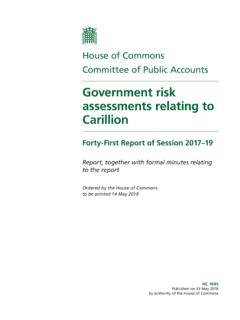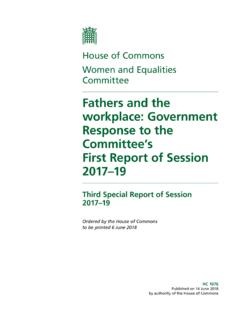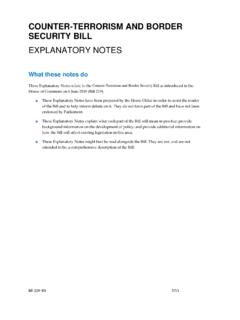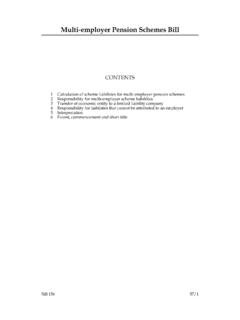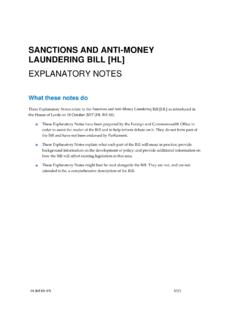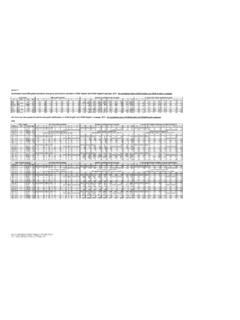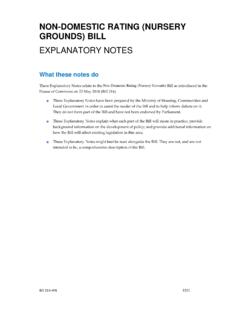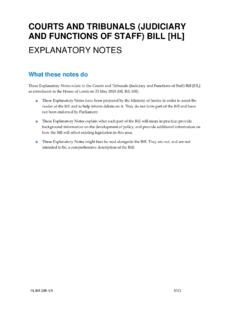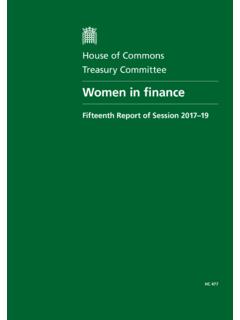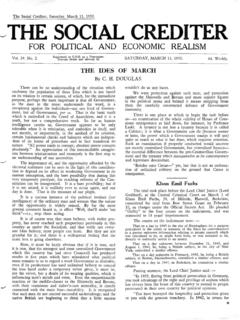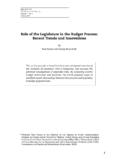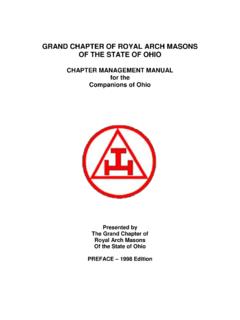Transcription of PARLIAMENTARY DEBATES - …
1 PARLIAMENTARY DEBATESHOUSE OF COMMONSOFFICIAL REPORTGENERAL COMMITTEESP ublic Bill CommitteeTAXATION (CROSS-BORDER TRADE) BILLF irst SittingTuesday 23 January 2018(Morning)CONTENTSP rogramme motion agreed evidence (Reporting to the House) motion agreed to sit in private agreed of till this day at Two o (Bill 128) 2017 - 2019No proofs can be supplied. Corrections that Members suggest for thefinal version of the report should be clearly marked in a copy ofthe report not telephoned and must be received in the Editor sRoom, House of Commons,not later thanSaturday 27 January 2018 PARLIAMENTARY Copyright House of Commons 2018 This publication may be reproduced under the terms of the Open Parliament licence,which is published at Committee consisted of the following Members:Chairs: MSKARENBUCK, MRSANNEMAIN Blackman, Kirsty(Aberdeen North)(SNP) Chapman, Douglas(Dunfermline and West Fife)(SNP) Dakin, Nic(Scunthorpe)(Lab) Davies, Chris(Brecon and Radnorshire)(Con) Dodds, Anneliese(Oxford East)(Lab/Co-op) Dowd, Peter(Bootle)(Lab) Hair, Kirstene(Angus)(Con) Hardy, Emma(Kingston upon Hull West and Hessle)(Lab) Hill, Mike(Hartlepool)(Lab) Kwarteng, Kwasi(Spelthorne)(Con) Menzies, Mark(Fylde)(Con) Morris, Grahame(Easington)(Lab) Reynolds, Jonathan(Stalybridge and Hyde)(Lab/Co-op) Rowley, Lee(North East Derbyshire)(Con) Rutley, David(Lord Commissioner of Her Majesty sTreasury) Stride, Mel(Financial Secretary to the Treasury) Stuart, Graham( PARLIAMENTARY Under-Secretary ofState for International Trade) Sturdy, Julian(York Outer)(Con) Wragg, Mr William(Hazel Grove)(Con)Colin Lee, Gail Bartlett,Committee Clerks attended the CommitteeWitnessesAnastassia Beliakova, Head of Trade Policy, British Chambers of Commerce.
2 William Bain, Policy Adviser, Europe and International, British Retail Consortium;Peter MacSwiney, Chairman, Agency Sector Management (UK) Limited, Co-chair of the Joint CustomsConsultative Committee s (JCCC) Customs Brexit Group (CBG), Trade Chair for the JCCCG ordon Tutt, Association of Freight Software Suppliers (AFSS)Jeremy White, Barrister in international trade and Customs and Excise law, Consultant Editor, Tolley s Customs& Excise Duties HandbookBarbara Scott, Director, Customs Associates LtdSue Davies, Strategic Policy Adviser, Which?Helen Dennis, Policy and Advocacy Manager, Fairtrade1223 JANUARY 2018 Public Bill CommitteeTaxation (Cross-border Trade) BillPublic Bill CommitteeTuesday 23 January 2018(Morning)[Ms KARENBUCKin the Chair]Taxation (Cross-border Trade) amThe Chair:Before we begin, will everyone ensure thattheir phones are switched to silent, including me, andremove all signs of illicit tea and coffee? We have threemotions to consider, which we can hopefully do are considering the programme motion, a motion toenable the reporting and publication of evidence, and amotion to allow us to deliberate in private about questionsbefore the oral evidence ,That (1) the Committee shall (in addition to its first meeting am on Tuesday 23 January) meet (a) at pm on Tuesday 23 January;(b) at am and pm on Thursday 25 January;(c) at am and pm on Tuesday 30 January;(d) at am and pm on Thursday 1 February;(2) the Committee shall hear oral evidence in accordance withthe following Table:DateTimeWitnessTuesday23 JanuaryUntil no later amBritish Chambersof Commerce;Agency SectorManagement;Association ofFreight SoftwareSuppliersTuesday23 JanuaryUntil no later amJeremey White,Barrister; CustomsAssociates Ltd;Fairtrade; Which?
3 Tuesday23 JanuaryUntil no later pmTrades UnionCongress; Unite;GMB; Public andCommercialServices UnionTuesday23 JanuaryUntil no later pmHansard SocietyTuesday23 JanuaryUntil no later pmUK Chamber ofShipping; BritishInternationalFreightAssociation;B ritish PortsAssociationTuesday23 JanuaryUntil no later than5 pmUK Steel;ChemicalIndustriesAssociation;Brit ish CeramicConfederation(3) proceedings on consideration of the Bill in Committee shallbe taken in the following order: Clauses 1 to 3; Schedules 1 and 2;Clauses 4 to 10; Schedule 3; Clauses 11 to 13; Schedules 4 and 5;Clauses 14 to 20; Schedule 6; Clauses 21 to 29; Schedule 7;Clauses 30 to 43; Schedule 8; Clauses 44 to 50; Schedule 9;Clauses 51 to 56; new Clauses; new Schedules; remaining proceedingson the Bill;(4) the proceedings shall (so far as not previously concluded) (MelStride.)Resolved,That, subject to the discretion of the Chair, any written evidencereceived by the Committee shall be reported to the House forpublication.
4 (Mel Stride.)Resolved,That, at this and any subsequent meeting at which oral evidenceis to be heard, the Committee shall sit in private until thewitnesses are admitted. (Mel Stride.)TheChair:Thedeadlineforamendment stobeconsideredat the first line-by-line sitting of the Committee was therise of the House yesterday and the next deadline willbe the rise of the House on Thursday for the Committee ssitting a week today. Copies of written evidence that amThe Committee deliberated in of WitnessesAnastassia Beliakova, William Bain, Peter MacSwineyand Gordon Tutt gave amThe Chair:Good morning, witnesses. Thank you forcoming along. We are now resuming our public are going to hear evidence from the British Chambersof Commerce, the British Retail Consortium, AgencySector Management and the Association of FreightSoftware Suppliers. I remind Members that all questionsshould be limited to matters within the scope of the Billand that we have to stick to the timings set out in theprogramme motion, so we will have to conclude thissession by am.
5 Will the witnesses start by introducingthemselves for the record?William Bain:Good morning, Ms Buck. I am WillieBain from the British Retail Consortium. It is very niceto be Beliakova:Good morning, Ms Buck. I amAnastassia Beliakova. I am head of trade policy at theBritish Chambers of MacSwiney:Good morning, I am PeterMacSwiney from Agency Sector Tutt:Good morning everyone, I am GordonTutt from the Association of Freight Software Chair:Thank you very much. Can we start withPeter Dowd?Q1 Peter Dowd(Bootle) (Lab): This is a broad questionin relation to the concerns that your members may haveexpressed any of you can pick this up on the capacityof Her Majesty s Revenue and Customs and UK BorderForce to absorb changes to the customs Beliakova:An issue that our membershave raised this was something that we heard frommembers even before the whole Brexit question arose isstaffing capacity and in particular the ability to helpbusinesses with day-to-day questions that they may34 HOUSE OF COMMONSP ublic Bill CommitteeTaxation (Cross-border Trade) Billhave.
6 That is particularly important when businessesapply for various trade facilitations, such as inwardprocessing relief, or for various forms of certification,such as to be an authorised economic operator. Thereused to be a helpline at HMRC that is no longeravailable. Businesses would find it helpful if that werereintroduced. Another concern they have raised is thatthere is an evidenced shortage of staff dedicated togoods checks. That has been ongoing for a number ofyears, and questions are being asked about whetherthere is sufficient resource and focus allocated to goodschecks and support. Those questions will become muchmore acute with all the coming MacSwiney:There are always questions raisedabout the Customs Declaration Service, which is thereplacement for the customs handling of import andexport freight programme. I have said many times that Istill believe that between CDS and CHIEF, the computersystem will have sufficient capacity to handle thedeclarations.
7 To pick up on Anastassia s point, to enablegoods to move freely through the border post-Brexit wewill have to rely on advance information and bulkentries done with some form of simplified far as I can see, Border Force is not engaging verymuch with trade. What it wants the processes to be andwhat data elements it wants are still unclear. Customsseems to be getting bogged down with the authorisationprocess. All of that could do with being Tutt:Our association members have customerswho cover a wide range of different trade sectors. Oneof the common problems we have is getting approvalsprocessed quickly. That is particularly worrying. One ofthe recent changes that has been mooted is that before atrader can have their approval granted, they will have tohave their software contracts in place. Most traderswould not want to go to the cost and trouble of organisingand paying a software contract if they did not knowthey would get the approval. It puts the cart before ,weareexpectingtohavediscussionswith HMRC through the Joint Customs ConsultativeCommittee sub-group on how we can best streamlinethe whole approval Bain:One of the key things that our membershave said to us is that the last big change they wereasked to adjust to, which was the introduction of theUnion customs code, took companies three years to getready for.
8 There is good engagement with HMRC, butthere is concern about the capacity of the new CDSsystem to handle perhaps 255 million customs declarationsa year, depending on the kind of deal that is or is notnegotiated in the next few Peter Dowd:I have one more question, if I is your satisfaction level, on a level between oneand 10, or your confidence that the Government willfully engage prior to making customs-related regulationsonce the outcome of the Brexit negotiations is clear?How confident are you that the lines of communicationare actually in place?Peter MacSwiney:The lines of communication are inplace. I do not think there is enough time to have anyreal meaningful discussions. I think the original viewfrom the trade was that a five-year transitional periodwould be a minimum. Even if we get two years, it isdifficult to see what we could achieve in that Tutt:From a technical perspective, we alwayswork on a general rule that it takes two years from thetime that we have the full technical specifications to thetime we can actually implement.
9 That gives you an ideaof where we are at the moment. We are working closelywith HMRC s technical teams on the CDS is not an easy task. We are looking at a replacementto a service and a system that both the Government andthe trade are highly dependent on. Clearly, we want tomake sure that we get that absolutely right. We believethat Customs has taken some very sensible approaches,but we probably need to further mitigate the risk byenabling CHIEF to continue for a longer period, therebyallowing the transition from the current service to CDSover a longer period of Chris Davies(Brecon and Radnorshire) (Con):Would you not agree that the essence of the Bill is as anenabling Bill for when we leave the EU? All the Bill istrying to do is put arrangements in place. Would younot agree that the whole framework and the essence ofthe Bill is correct in that respect?Gordon Tutt:First, yes, you are right it is an enablingBill. It is very good that much of it is already containedin the Union customs code, so it actually provides areally good basis for future UK legislation.
10 It alsoavoids an awful lot of new requirements on trade,particularly on our side of the systems, because itadopts much of the concepts of the technology and thedata that are already maintained in the UCC Beliakova:To add to that, yes, of course itis an enabling Bill. We and our members welcome thefact that it aims to replicate the UCC as much aspossible because, as has already been mentioned, a lotof effort and time have been put into adhering to thenew aspects of the Union customs code. However, whatwe have noticed is that some elements of the code havenot been addressed in the instance on origin, the means of defining originhave been set out. However, origin declaration has notbeen mentioned. That is just as important, if not moreso in some aspects, than rules of origin, when it comesto international trade. There are various means in whichbusinesses now declare origin. Sometimes it is throughsub-certification; sometimes it is through certificates oforigin.
